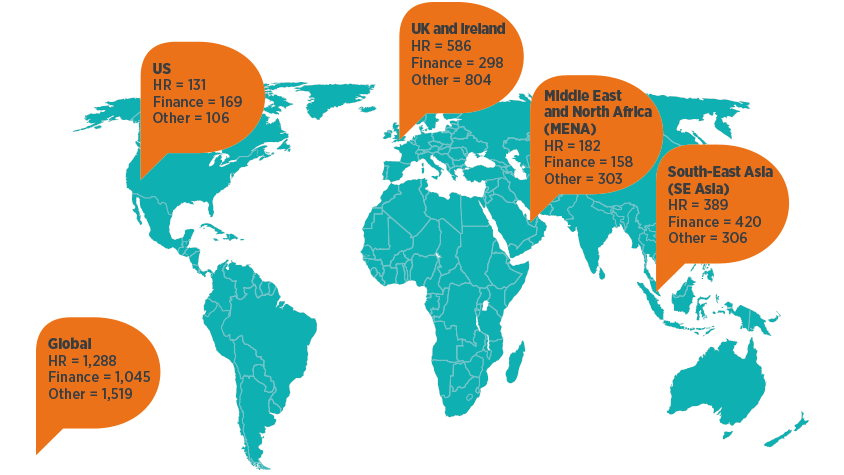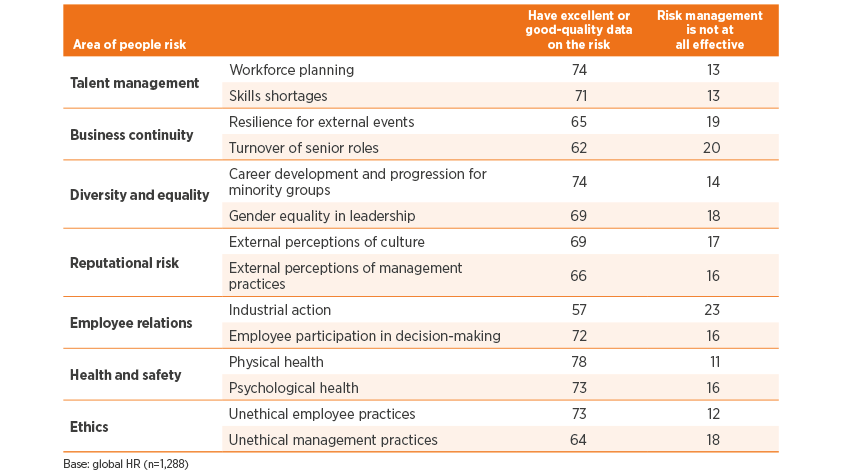People analytics: Driving business performance with people data
A global survey of multiple professional perspectives on people data and people analytics

A global survey of multiple professional perspectives on people data and people analytics

People analytics is rising up the agenda for organisations globally. With technology providing businesses more and more ways to collect people data, using this information to gain workforce insight, drive business performance and enhance employee experience is expected to grow.
To gain international perspectives on how organisations use people analytics, our recent survey People analytics: Driving business performance with people data asked 3,852 business professionals from the UK and Ireland, US, Middle East and North Africa (MENA) and South-East Asia their views on how their organisations use people analytics to understand people data (see Figure 1). This global survey finds that HR professionals using people data to tackle significant challenges, with three-quarters (75%) tackling workforce performance and productivity issues using people data. But, the survey also reveals that how and when organisations use people data differs across region. These international focus reports examine how business professionals in the UK and Ireland, MENA, US and SE Asia use people data and compares regional practice.
Figure 1: Participants in our research

We used the findings from the survey to understand:
Download the reports below
Using the survey we were able to describe a strong people analytics culture as existing in organisations that:
We then surveyed non-HR professionals on the impact of people analytics in their business. We found that people analytics culture is positively associated with overall business performance: 65% of those who said they work in an organisation with a strong people analytics culture said that their business performance was strong when compared with competitors, but only 32% of those in weak analytics cultures report strong business performance. This represents a 33-point difference.
[Base: global non-HR (n=667)]
We also found that HR professionals are using people data to tackle significant challenges their organisations are facing. Our survey found that 75% of HR professionals globally are tackling workforce performance and productivity issues using people data, illustrating the importance of this information for strategic workforce issues.
[Base: global HR (n=1,288)]
We found that visibility of data (for example via data dashboards), correlates with improved outcomes, but access differs by profession: while almost three-quarters (71%) of HR professionals globally have access to people data, only two-fifths (42%) of finance professionals state that they do, illustrating a clear gap between the professions.
[Base: global HR (n=1,288); global finance (n=1,045); global other (n=1,519)]
We found that visibility of people data improves perspectives on performance, with 73% of respondents from a strong performance business agreeing or strongly agreeing that they have access to a dashboard of people data, in comparison with 50% of those who indicated their business is of average performance.
Overall we found that the HR profession continues to lack the skills and confidence to undertake advanced levels of people analytics. We found that this differed by region, for example HR professionals in the UK lack the confidence to conduct advanced people analytics: just over one-fifth (21%) of UK HR professionals are confident conducting advanced analytics, compared with 46% in SE Asia, representing a 25-point difference.
[Base: Global HR basic analytics (n=1,160); UK HR basic analytics (n=524); SE Asia HR basic analytics (n=357); MENA HR basic analytics (n=167); US HR basic analytics (n=112); Global HR intermediate analytics (n=1,045); UK HR intermediate analytics (n=446); SE Asia HR intermediate analytics (n=343); MENA HR intermediate analytics (n=158); US HR intermediate analytics (n=98); Global HR basic multivariate techniques (n=856); UK HR basic multivariate techniques (n=315); SE Asia HR basic multivariate techniques (n=314); MENA HR basic multivariate techniques (n=147); US HR basic multivariate techniques (n=80); Global HR advanced multivariate techniques (n=735); UK HR advanced multivariate techniques (n=229); SE Asia HR advanced multivariate techniques (n=294); MENA HR advanced multivariate techniques (n=140); US HR advanced multivariate techniques (n=72)]
In our analysis of UK data we found there is untapped potential in UK HR professionals: we found that 21% of UK HR professionals say they are confident or very confident with the more advanced techniques, such as structural equation modelling, but only 6% of UK HR professionals say they use these in their day-to-day role, suggesting many HR professionals do not have the opportunity to use their skills in their role. We also investigated other professional perspectives on HR skills and capability.
[Base: global HR (n=1,288); global finance (n=1,045); global other (n=1,519)]
Data protection of workforce data continues to be an important issue for all professional groups: there is broad agreement across all professional groups that overall people data is adequately protected. Less than two-thirds (61%) of HR professionals believe their organisation has a joined-up approach to protecting its data.
[Base: global HR (n=1,288); global finance (n=1,045); global other (n=1,519)]
We also investigated the quality of people data available for understanding key people-related risks. We found that data quality is often highly rated, but risk management of some key people risk areas, such as turnover of senior roles, have low levels of effectiveness.
We also investigated the quality of people data available for understanding key people-related risks. We found that data quality is often highly rated, but risk management of some key people risk areas, such as turnover of senior roles, have low levels of effectiveness.
Table 1: Effectiveness of risk management types and correlation with analytics culture (%)

We found that the transparency of workforce data is critical if it is to be used by line managers in their decision-making, in particular those in finance-related roles. Visibility of people data helps HR and non-HR in making decisions.
Another important finding from this study is the importance of people analytics skills and confidence to driving good outcomes. Regional variation shows how skills and confidence are related to outcomes, with SE Asia often leading practice with higher-quality analytics skills. The UK is particularly limited in both confidence and skills levels, highlighting a potential risk to future capability.
We also found that people risk, which is an emerging area in practice, is being understood through the application of people data. Issues such as people data security have become important given the recent implementation of the General Data Protection Regulations in the EU and are being measured using people data. However, there is still some way to go to improve how HR professionals articulate broader issues of people risk and opportunity.
This work highlights that there is much potential in developing people analytics practice, both in terms of the HR teams producing and consuming data, and the non- HR professionals still to realise the potential value of people data to their outcomes. HR must take the lead to establish people analytics as a core component of the future evidence-based profession. Only by doing this do we believe that the potential value long promised by people analytics will finally be realised.
We make the following key recommendations for HR practice:
Tackling barriers to work today whilst creating inclusive workplaces of tomorrow.
Discover our practice guidance and recommendations to tackle bullying and harassment in the workplace.

An overview of the purpose and benefits of HR policies and how to implement and communicate them effectively throughout an organisation

Listen to our new fortnightly podcast providing expert insights from HR leaders on the topical issues impacting the world of work
Listen now
Dedicated analysis of job quality and its impact on working lives in Scotland

Our series on current practices, future models and successful transformations

A Northern Ireland summary of the CIPD Good Work Index 2024 survey report


Dedicated analysis of job quality and its impact on working lives in Scotland

A North of England summary of the CIPD Good Work Index 2024 survey report